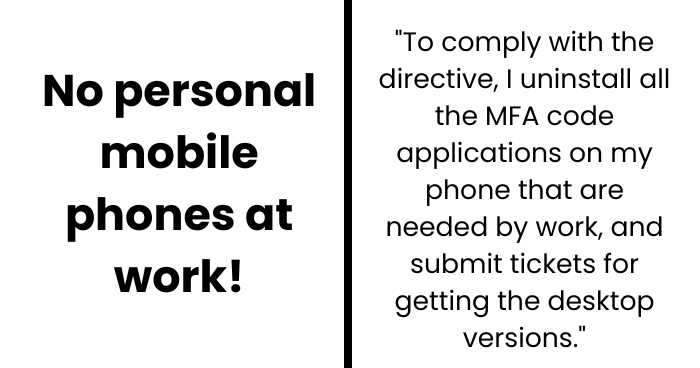Employee Is Told By Boss They Can’t Use Personal Phone At Work Anymore So They Maliciously Comply, End Up With No Ability To Work At All
The tale of malicious compliance shared here is a classic case of “be careful what you wish for.” The protagonist, an IT cybersecurity professional, recounts a workplace situation where a poorly thought-out directive from their boss inadvertently paralyzed operations. The boss’s new rule banned personal phone usage at work, a decree seemingly unaware of the fact that the company’s multi-factor authentication (MFA) systems heavily relied on employees’ personal devices. Without access to company-provided phones or alternatives, the worker cleverly exploited the situation, leading to a comedic unraveling of the boss’s hasty decision-making.
When the worker complied with the no-phone rule by removing all work-related MFA apps from their personal device, chaos ensued. Attempts to get desktop versions of the software were met with confusion, as such versions did not exist. Ironically, the same boss who issued the directive found themselves entangled in bureaucratic red tape of their own creation, scrambling to secure approvals for a solution. Meanwhile, the employee enjoyed an unproductive day of internet browsing, highlighting the unintended consequences of rigid, top-down decision-making.
Read for more info Reddit








This situation underscores several lessons about workplace management and the importance of understanding operational dependencies before implementing blanket policies. Here are some key takeaways:
1. Operational Realities and Dependency on Personal Devices
In many modern workplaces, employees’ personal devices play a critical role in operational workflows, particularly in sectors like IT. A 2022 report by Gartner noted that 60% of organizations use Bring Your Own Device (BYOD) policies, particularly in IT and cybersecurity, to streamline operations without incurring extra hardware costs. This reliance creates a gray area in terms of ownership and responsibility. Prohibiting personal device use without providing company-owned alternatives can lead to disruptions, as seen here.
2. Poorly Communicated Policies and Their Fallout
Policies that fail to account for ground realities often create more problems than they solve. Research from Harvard Business Review emphasizes the importance of employee feedback in policy design, especially for rules that significantly alter workflows. In this story, the boss’s unilateral decision-making bypassed practical considerations, such as the company’s reliance on personal devices for MFA, resulting in unnecessary friction.
3. Malicious Compliance as a Subtle Workplace Protest
Malicious compliance, while humorous, can highlight underlying dissatisfaction with managerial practices. Case studies from workplace psychology journals reveal that such behavior often stems from employees feeling undervalued or overburdened by top-down decisions. The worker’s actions here weren’t aimed at sabotaging the company but were a natural consequence of following the new rule to the letter.
Related Precedents and Case Studies
- Case of Boeing’s BYOD Policy Changes (2018): Boeing faced backlash after introducing restrictions on personal devices at work without providing company alternatives. Similar disruptions occurred when employees couldn’t access internal systems reliant on personal devices. Boeing ultimately reversed its policy, highlighting the need for better policy frameworks.
- Legal Aspects of BYOD Policies: In some jurisdictions, companies that rely on employees’ personal devices must provide compensation or alternatives. For instance, in California, Section 2802 of the Labor Code mandates reimbursement for business-related use of personal devices, potentially exposing companies to legal challenges if such policies are enforced without alternatives.
Reddit Comments:








Closing Thoughts
This story illustrates how seemingly simple workplace directives can spiral into inefficiency when detached from operational realities. Whether it’s IT systems or workplace rules, a comprehensive understanding of dependencies, clear communication, and stakeholder involvement are key to effective policy implementation. For the narrator, the day may have been an amusing anecdote; for the boss, a valuable lesson in management dynamics.



